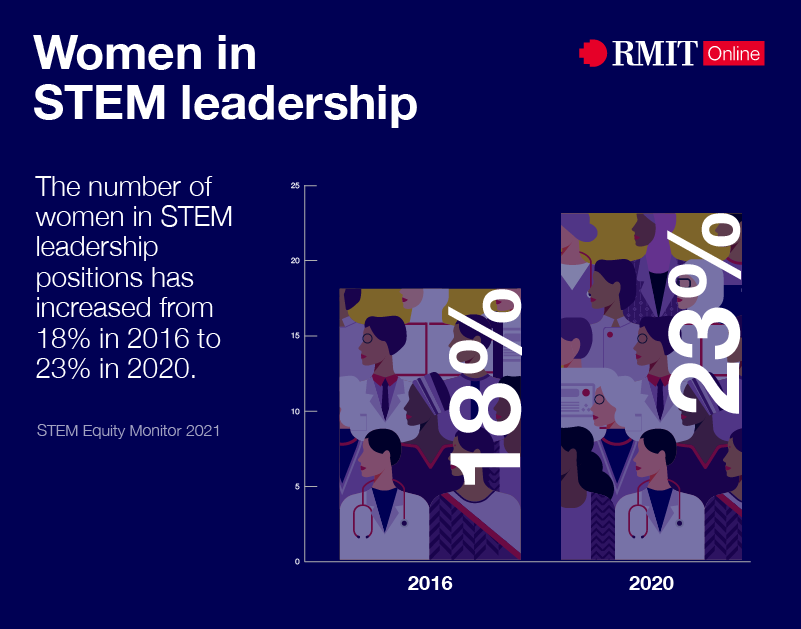Why gender diversity matters in data science

Developing machine learning models is one of the main tasks for data scientists. According to Analytics Steps, it’s a subset of artificial intelligence (AI) that aims to teach computer systems and algorithms to make decisions based on data. For example, facial recognition technology uses machine learning techniques to confirm a person’s identity based on an image.
Given how influential the profession is in shaping new technologies, increasing diversity in data science is important. Yet, according to the National Skills Commission, only 32 per cent of data science professionals in Australia are women. And when you look at the STEM (science, technology, engineering and mathematics) workforce as a whole, women represent only:
- 28 per cent of employees
- 23 per cent of senior leadership positions
- 11 per cent of CEO/head of business-level positions
While achieving diversity and inclusivity at work involves more than simply improving gender equality, it can be a good starting point. According to one study, women-led teams and organisations are 17 per cent more likely to feel confident about having an inclusive culture than those that are male-led.
Yet historically, women have been discouraged from participating in STEM and leadership roles for many reasons, such as:
- bias and stereotyping that start from a young age
- inflexible working arrangements
- job insecurity
- not having enough same-gender role models
- lack of encouragement, support networks, professional groups and leadership training for women
It’s these underlying and far-reaching societal and psychological influences that explain why there are still so few women in certain science and other STEM fields. But we’re making progress, and the world continues to evolve. Let’s explore how the status quo for women in STEM is changing for the better.

Progress is happening
Australian women’s representation and participation in STEM have both improved.
- The proportion of women working in all STEM-qualified industries has continued to increase (bad backlink here with redirect notice from 24 per cent in 2016 to 28 per cent in 2020.
- Australian STEM industries have a smaller wage gap compared to the average across all industries. For example, in 2018, the average gender pay gap across all industries was 14.1 per cent. However, a national survey of the STEM workforce at the time revealed an industry pay gap of only 12.4 per cent.
- The number of women in STEM who hold key leadership roles has increased from 18 per cent in 2016 to 23 per cent in 2020.
What’s more, Australia’s data science industry recently recognised the contribution of women to the field, holding its first-ever Women in AI Awards in 2021. The awards were established to honour the top Australian and New Zealand women in AI. These women are, “pioneers who are taking the road less travelled; the women who are paving the way for others to reach even further and to dare to dream even bigger.”
The 2021 award winners have made some remarkable achievements, and are well on their way to becoming globally famous female data scientists.
Take Jamila Gordon, the overall winner and recipient of the 2021 ‘Innovator of the Year’ award. She’s the CEO and founder of the tech platform Lumachain. Her company’s mission is “nothing less than to transform the global food industry, with technology that enables a better, safer and more sustainable supply chain.”
It’s been an extraordinary journey for Jamila. Born to a family of nomads in regional Somalia, “she arrived in Australia at the age of 18, having escaped the Somali civil war alone and being virtually homeless in Kenya.”
After learning English and, “falling in love with technology”, Jamila started her stellar corporate ascent. Ultimately she became, “a global executive with IBM and Group Chief Information Officer of Qantas Airways and CIMIC, before deciding to launch Lumachain."

Women are shining a light on diversity in data science
This year, RMIT’s own Professor Flora Salim has been selected as a finalist in the upcoming Women in AI Awards. Professor Salim’s titles include:
- Professor at the School of Computing Technologies at RMIT
- Co-Deputy Director of RMIT Centre for Information Discovery and Data Analytics (CIDDA)
- Associate Investigator of ARC Centre of Excellence in Automated Decision Making and Society (ADM+S)
Her research cuts across the areas of:
- human behaviour modelling
- machine learning with multimodal time-series and spatio-temporal data
- AI on the edge (IoT, sensors, wearables, digital systems and infrastructures)
With luminaries like Jamila and Professor Salim continuing to make their mark on the world, the future for women in data science is radiant.
A bright future ahead for data science careers
According to the Australian Government, data science is one of the top 25 emerging occupations in the country. As the industry grows, the number and salary of data science leadership roles will grow with it, creating a bright future for data scientists.
Data science is becoming increasingly important as our society relies more and more on AI and machine learning technologies. This is why diversity matters in data science. In addition to improving employment and economic outcomes for women, more diversity in data science reduces the risk of embedding bias into machine-human interfaces.
At RMIT Online, we value building a culture of inclusion and diversity for staff and students. We’re committed to empowering women in STEMM (science, technology, engineering, mathematics and medicine).
And we’ve made real progress in gender equality by:
- being an Employer of Choice for Gender Equality, Workplace Gender Equality Agency since 2018
- supporting women in STEMM, leading to us receiving the title of recognition holder for the Athena SWAN strategy
- showing long-term dedication to improving gender equity and diversity, earning us the Athena SWAN Bronze award
- being in the top 10 for all categories of the UN’s Sustainable Development Goals
We believe that diverse perspectives lead to innovative, inclusive STEMM solutions. It’s why we proudly support female-identifying students to access and succeed in STEMM, with a range of opportunities and activities such as:
- promoting role models for women in STEMM by showcasing nine inspirational RMIT researchers who’ve gained remarkable achievements inside and outside the workplace
- providing empowering benefits, diverse working arrangements and opportunities to promote our women in STEMM staff

Get a head start at RMIT Online
At RMIT Online, we believe values are more than words – we’re committed to living them. For example, one of the ways we exemplify our values of diversity and inclusion is through our Graduate Certificate in Data Science.
This course has been created to help business professionals gain the critical foundations in data wrangling, programming, analytics and visualisation that will put you in demand.
The program is also 100 per cent online, making it flexible and convenient, especially if you work full-time or need to juggle study with family and social commitments. We’ve also structured the content into time-based blocks, so you can manage your studies to fit your lifestyle.
Career empowerment starts here
RMIT Online’s Graduate Certificate in Data Science is here to empower innovative women in STEMM. Get ready to take your career to new heights by learning how to become the essential link that businesses need.
Get in touch with one of our Student Enrolment Advisors today on 1300 701 171, and let them guide you through the process of moving towards your career goals.

